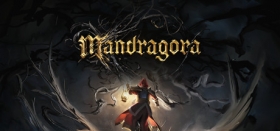
Mandragora Preview
Developed by Prima Game Studio and published by Knights Peak, Mandragora is a soulslike metroidvania title where you take control of an Inquisitor of Crimson City on a quest to find an enemy of the state: a witch.
This title partook during the Steam Next Fest event, where players all around the world had the opportunity to check it out before its release. Greeted by a paragraph of dialogue telling you the story and a page describing the controls, you set out to the world of Faelduum to seek out the witch... though the perilous world has been ravaged by monsters, the journey won't be easy. The demo only had one of the six classes available to play — taking on the role of the Vanguard, I set out on my mission across one of my most-anticipated titles.
Mandragora's soulslike and metroidvania elements begin immediately as you set off to fight a few ghoulish creatures and engage with the parkouring mechanic. Though the character feels a bit heavy at the start, the capability to grab onto ledges to climb up and down the world made it feel more realistic than usual ventures into metroidvania spheres, where characters have high jumps and flowy movement. The change of pace is nice and welcome, as though I do love platforming ventures, the down-to-earth movement kept the themes of the title in mind, with heavier movement akin to soulslikes we've played in the past, though far more agile than them.

The short demo doesn't offer much in terms of lore for those hungry to know more about the world — the few glimpses of dialogue mostly focused on advancing the story, though a few lines here and there got a chuckle out of me. Instead, the primary focus of the hour I got to play was the combat and puzzle elements, as I had the opportunity to try out several types of encounters against a wide variety of foes.
The combat is pretty much what you would expect of a 2D soulslike experience. You have your quintessential dodge roll and stamina management, thoughMandragora's visually distinct models and impressive design make it easier to discern incoming attacks, offering the opportunity to experiment with parrying (and, in fact, oftentimes encouraging it).
Enemies varied from fantasy creatures to regular bandits, and they all had pretty much the same sort of fighting pattern that encouraged a back-and-forth battle system. Avoiding enemy attacks often boiled down to blocking, parrying, or dodging out of the way and using the brief window to get two or three hits in; though it's a very coordinated process with very few attacks per foe, it's a tried-and-true system that didn't detract from the experience.

Though the combat strayed from soulslike into a strict definition, with only but a few encounters giving me the difficulty you'd come to expect from the genre, I wouldn't really say it was bad, just different. In stark contrast to Hollow Knight, which is a fast-paced action title, Mandragora approaches its battling system in a more FromSoftware traditional formula, instead expecting you to take your time per fight to find the opening and learn the patterns. It's a very basic combat system that, though it doesn't innovate on anything, does its job of remaining entertaining.
Likely, the best system of it all is the adrenaline bar that I quite enjoyed. Engaging in combat continuously and trading blows with your opponent gives you adrenaline, which can be used to cast unique attacks and abilities that would otherwise go to waste, as leaving combat and taking it slow starts to drain it. The constant desire to keep the adrenaline bar filled, alongside a talent named Eternal Rage I acquired later on, gave me the incentive to keep the experience fast-paced, which highlighted the enjoyable combat of it all.
With this all said, I feel that the demo is a fraction of the gameplay that Mandragora has in store. Having the opportunity to try one of the six classes sounds minuscule, but when paired with the ginormous talent tree that greeted me the moment I levelled up, it showed me how little we know of the experience thus far. Build variety and the possibility to explore numerous runs is one of the things that makes a soulslike enjoyable and replayable, and the sheer amount of customisation that already seems to be implemented paints a positive picture of that ideology of the genre.

Though it strays from regular soul-focused levelling up into a grid-based talent tree that lets you work towards talents, this system felt closer to an ARPG bleeding into the soulslike genre, and I quite liked the idea of a more full-fledged class system than what soulslikes tend to offer. As a massive fan of Sekiro: Shadows Die Twice, I think the genre benefits from having a well-thought-out class system that gives you more abilities and unique attacks rather than an ocean's length of weapons with different timings and a puddle's depth of creativity. Though the large variety will surely miss from the massive amounts of weapons that are acquirable in traditional soulslikes, I'm excited to see a title veer off into innovation, exploring instead abilities, passives, and RPG-style combat that isn't equipment-focused, and Mandragora seems to be promising in that area.
Though it's easier than I anticipated, I'm intrigued by the release of Mandragora. Faelduum's story and characters are captivating and charming, with voice acting that didn't feel out of place and a story I genuinely looked forward to experiencing. Free from riddles and fodder for theory crafters, a straightforward narrative with RPG combat and platforming elements is something I'm enthused to learn more about.








COMMENTS